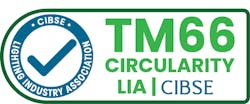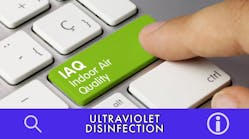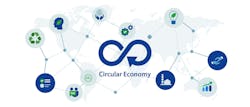Britain’s Lighting Industry Association (LIA) has teamed with the London-based Chartered Institution of Building Services Engineers (CIBSE) to provide certification showing that lighting products live up to vendors’ circularity claims.
Circularity is the eco principle which minimizes the use of new materials in goods and maximizes the re-use of the goods and/or of the substances and components in them.
Telford, England–based LIA will issue certificates to vendors who prove they have met the criteria of CIBSE’s “Technical Memorandum 66.” CIBSE issued TM66 in October 2021, laying out requirements for circularity in lighting products. TM66 also prescribes a self-certification method, called TM66 CEAM (Circular Economy Assessment Methods).
The new verification process goes by the name TM66 Assured. It is run by LIA and endorsed by CIBSE, the two outfits said in a press release. LIA first announced the scheme in March 2022, but has spent the last 15 months working out the details and gaining CIBSE’s approval.
“TM66 Assured allows participating manufacturers to demonstrate their sustainability efforts, providing clear differentiation from unsubstantiated greenwashing,” said David Barnwell, managing director of Holophane Europe Ltd., a Milton Keynes, England–based lighting company owned by Atlanta’s Acuity Brands.
To gain certification, vendors submit documents that detail their CEAM self-assessment. CEAM includes 72 questions requiring supporting evidence. It covers four categories: “product design,” with an eye on longevity and repairability; “materials,” focused on recyclables; “manufacturing,” looking at additive and subtractive techniques as well as localization of sources; and “ecosystem,” which examines services for repairs and upgrades.
The TM66 Assured verification process can also require vendors to send products to LIA to evaluate.
Certification lasts for three years. It is displayed in several ways, including as a listing in the LIA database. LIA is also issuing logos that vendors can post on their own websites and affix to products to show they have gained the thumbs-up.
LIA is charging certification prices that vary depending on the number of products and whether the vendor is an LIA member. For example, a test of a single product costs £200 for a member and £400 for a non-member. Prices per test go down if the vendor commits to multiple tests.
LIA is the UK’s lighting industry trade body. It claims to be the largest lighting industry trade group across the European continent. CIBSE is an international trade association for the building services industry.
The new certification program is part of a broad effort in the lighting industry to adopt eco-friendly design and manufacturing processes.
In one pending development, lighting recycling specialist Recolight is expected to soon launch a remanufacturing web portal called Circular Place to support the re-use of existing lighting products. Recolight has pushed back the target launch slightly, to mid/late July, a spokesperson told LEDs Magazine. It had been targeting late June.
Vendors including Signify, Fagerhult, and Glamox all include luminaires in their mix that feature eco-friendly materials. Some lighting manufacturers are also submitting their products for Declare labels, which is a materials transparency initiative.
MARK HALPER is a contributing editor for LEDs Magazine, and an energy, technology, and business journalist ([email protected]).
Follow our LinkedIn page for our latest news updates, contributed articles, and commentary, and our Facebook page for events announcements and more. You can also find us on Twitter.

Mark Halper | Contributing Editor, LEDs Magazine, and Business/Energy/Technology Journalist
Mark Halper is a freelance business, technology, and science journalist who covers everything from media moguls to subatomic particles. Halper has written from locations around the world for TIME Magazine, Fortune, Forbes, the New York Times, the Financial Times, the Guardian, CBS, Wired, and many others. A US citizen living in Britain, he cut his journalism teeth cutting and pasting copy for an English-language daily newspaper in Mexico City. Halper has a BA in history from Cornell University.




![The DesignLights Consortium continues to make progress in shifting outdoor lighting products and implementation practices toward a more restrained and thoughtful strategy. [Image does not represent a DLC qualified fixture.] The DesignLights Consortium continues to make progress in shifting outdoor lighting products and implementation practices toward a more restrained and thoughtful strategy. [Image does not represent a DLC qualified fixture.]](https://img.ledsmagazine.com/files/base/ebm/leds/image/2024/08/66be810888ae93f656446f61-dreamstime_m_265700653.png?auto=format,compress&fit=&q=45&h=139&height=139&w=250&width=250)
